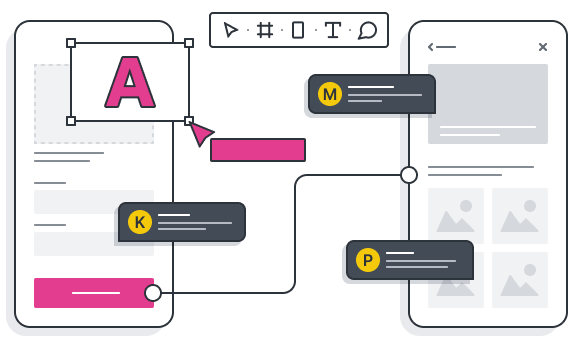As the job market evolves and skills gaps widen, continuous professional development is a huge priority for employers and workers alike.
Professional and continuing education providers have a pivotal role to play in developing a skilled, job-ready workforce. They must remain agile and dynamic, keeping abreast of industry demand and teaching skills that are both relevant and applicable to the world of work.
Professional certifications present a great opportunity to update your portfolio, increase enrollments, and tap into a major new revenue stream.
In this post, we’ll explore what sets professional certifications apart from traditional online courses and bootcamps, and outline the benefits of adding a professional certification to your offering.
What is a professional certification?
A professional certification provides official recognition of a learner’s skills and expertise in a particular area.
Professional certifications are usually developed and/or endorsed by professional associations or third-party bodies, meaning they must adhere to stringent regulatory standards.
They typically focus on teaching specialist skills, enabling learners to keep their skills up-to-date and helping employers to address skills gaps.
How is a professional certification different from a bootcamp or online course?
Professional certifications, bootcamps, and online courses are all popular options when it comes to learning new skills. They offer great flexibility, and are typically more affordable and less time-intensive than a traditional college degree.
But, because the general market for courses and bootcamps is largely unregulated, the quality and relevance of the learning experience can vary significantly from one provider to the next.
Students might pay thousands to attend a bootcamp, but there’s no real guarantee that the curriculum and teaching methods will be up to a good standard.
Most bootcamps are offered by generic providers who cover multiple topic areas and disciplines, without any specialist expertise in one particular industry. You’ll find no shortage of tech bootcamp providers, for example, who run the whole gamut—from data analytics and cybersecurity through to web development, design, and product management.
Compare this to a specialised provider like the UX Design Institute and you’ll find a stark difference in terms of quality and industry expertise. UX Design Institute is the global leader in UX education and certification—thanks to their highly focused approach that ensures quality and depth, as opposed to quantity and breadth.
Even if you find a bootcamp with a high quality, expert curriculum, the learning content can very quickly become outdated. The UX industry is incredibly fast-paced, and maintaining a relevant curriculum requires near-constant review and updates. For specialised providers who focus on one particular discipline, this ongoing review process is much more achievable and ingrained. For generic providers with multiple offerings, not so much.
As such, many students thrive within the context of their bootcamp. But, when the time comes to find a job, the skills they’ve learnt may fall short of what’s required in the current world of work.
This is where professional certifications stand out.
They must be reviewed and approved by an external body to ensure quality, accuracy, and industry relevance. Learners can trust that they’re receiving legitimate, effective training—and, for that very reason, professional certifications hold much more credibility among employers.
For professional and continuing education providers who want to teach job-relevant skills, provide high quality, industry-approved curricula, and appeal to employers and upskillers alike, professional certifications make a great addition to your program portfolio.
Why add a professional certification to your program portfolio? 7 major benefits for continuing education providers
Professional certifications offer many benefits for employers, upskillers, and education providers. Here are some of the most compelling reasons to add a professional certification to your continuing education portfolio:
- Make sure you’re teaching practical, job-relevant skills—not just outdated theory
- Help to develop a future-ready workforce and address critical skills gaps
- Attract both upskillers and employers alike, for whom continuous professional development (CPD) is of growing importance
- Grow your revenue
- Enhance your reputation and stand out as a relevant, skills-focused education provider
- Improve the flexibility and accessibility of your courses
- Remain agile and adaptable as the industry evolves
Now let’s explore each key benefit in more detail.
1. Teach practical, job-relevant skills—not just outdated theory
Professional certifications focus heavily on job-relevant training. Rather than simply teaching theoretical concepts based on outdated research, they’re built to equip learners with knowledge and skills that are immediately applicable to the current world of work.
They do this by partnering with employers and industry experts to assess what skills are most relevant for the job market right now. At the UX Design Institute, for example, all certifications are reviewed by a dedicated Industry Advisory Council made up of tech industry recruiters, employers, and design leaders. This ensures that all course curricula are up-to-date and directly aligned with what employers are looking for.
| The benefit for continuing education providers: Keep your educational content at the cutting-edge and turn out work-ready graduates who can confidently apply their new skills to their field of choice. |
2. Help to address local skills gaps
With technology advancing at a rapid rate, the demands of the job market are also changing. We’re seeing huge skills gaps emerging across a variety of sectors, especially in the digital realm.
Workforce development is a major topic right now, and continuing education providers have a critical role to play. But, as it stands, the current educational market isn’t keeping pace.
In the United States especially, workforce experts are highlighting the so-called ‘great misalignment’—a significant mismatch between the supply of certificates and associate’s degrees and the future demand for workers.
In other words, many educational programs are not offering the types of credentials that match the job market’s current and future needs, resulting in a major gap between what students are trained for and the kinds of jobs available.
With relevant professional certifications, continuing education providers can help to close these gaps, build a skilled and competent workforce, reduce unemployment, and fuel economic growth.
| The benefit for continuing education providers: Be a driving force for workforce development and a key player in addressing both local and global skills gaps. |
3. Appeal to upskillers and employers
Continuous professional development (CPD) is a top priority for today’s employers—not only for the purpose of addressing skills gaps, but also as a means to boost employee retention.
At the same time, professionals in the job market are increasingly recognising the value of upskilling and reskilling. Candidates want to remain relevant and competitive, and boost job satisfaction by branching out into new specialisations.
Both upskillers and employers alike are favouring credible, job-relevant courses that actually reflect their needs and interests. To appeal to this important audience, continuing education providers must provide up-to-date, expert-approved, and highly practical training—such as that offered by professional certifications.
| The benefit for continuing education providers: Become the go-to provider for professionals looking to upskill, and for employers who want to train their employees in specialist skills. |
4. Grow your revenue
For continuing education providers, professional certifications can open up a whole new revenue stream—and a large one at that.
By 2029, it’s estimated that the number of users in the professional certificates market will surpass 75 million. That amounts to a projected revenue of over $8 billion (source: Statista).
As the market grows, providers who don’t offer professional certifications will miss out on a crucial audience segment, and the revenue they bring with them.
| The benefit for continuing education providers: Tap into the fast-expanding professional certificates market and open up a large new revenue stream. |
5. Enhance your reputation
There’s no getting away from it: the professional and continuing education market is crowded and competition is tough. And, with the near-constant influx of new providers promising to teach the most in-demand skills, standing out can be tricky.
With a professional certification in your portfolio, you can cement your reputation as a relevant, skills-focused education provider that’s in tune with current market demands.
And it’s not just about relevance. With many professional certificate programs subject to external, third-party review, they can enhance your credibility as an education provider, too.
Take the UX Design Institute’s Professional Diploma in UX Design, for example. The course is developed in collaboration with UX industry experts and vetted and endorsed by Glasgow Caledonian University to ensure that the curriculum meets industry standards and passes certain quality checks. And not just once; the course must be reviewed each year in order to retain its endorsement from the university.
| The benefit for continuing education providers: Stand out as a relevant, highly reputable provider offering quality-approved certifications. |
6. Improve the flexibility and accessibility of your courses
Many professional certification courses are delivered entirely online, affording adult learners and continuing ed professionals the flexibility to fit their studies around work, care responsibilities, and other commitments.
And, with online certifications, you eliminate the need to travel or be present at a specific location—which means your courses can be accessed by a broader audience, regardless of where they live.
Not only is this beneficial from a business perspective; it also helps to promote diversity and equity within the continuing education space.
| The benefit for continuing education providers: Improve the flexibility and accessibility of your courses and diversify your audience. |
7. Remain agile and adaptable
The job market is constantly evolving. New skills gaps are emerging all the time, and employers’ needs and requirements can change drastically from one year to the next.
As a continuing education provider, staying ahead of industry trends is critical. Providers who don’t update their portfolio to meet current demand will quickly run the risk of stagnating and being seen as outdated.
By adding relevant professional certifications to your portfolio, you can ensure you’re at the cutting edge of the market and lead the way as an agile, adaptable, and up-to-the-minute provider.
| The benefit for continuing education providers: Avoid stagnation; remain agile, dynamic, and responsive to market trends. |
Partner with UX Design Institute to teach in-demand UX skills
Some of the biggest skills gaps at present are within the tech sector—and, with tech jobs expected to increase significantly in coming years, this gap will only widen without adequate workforce development.
UX skills in particular are in high demand. In the State of UX Hiring Report 2024, UX Design Institute surveyed over 500 UX professionals and leaders globally to understand key trends shaping the UX hiring landscape, and to gauge employers’ current expectations and skills requirements.
Key findings from the report show that demand for UX skills is expected to increase in the next few years, with 68% of hiring managers surveyed predicting a greater need for UX professionals at their organisation.
The report also highlights that the majority (77%) of UX hiring managers look for a UX-specific qualification when hiring entry-level candidates—with 52% prioritising candidates with a UX certification or diploma.
In their Future of Jobs 2023 report, the World Economic Forum forecasts that design and UX skills will be a top priority for businesses between 2023 and 2027. Despite fears that the UX job market is oversaturated, UX jobs continue to grow at a steady pace—and employers increasingly struggle to hire job-ready candidates.
Partner with UX Design Institute to:
- Teach in-demand skills and close the ever-growing tech and design skills gap
- Offer industry expert-approved, university credit-rated curricula to continuing education professionals
- Increase your enrollments and keep your programme portfolio up-to-date
- Grow your revenue
If you’d like to learn more about adding a professional UX certification to your continuing education offering, refer to our partnerships page for further information.
At UX Design Institute, we’re seeking to close the UX skills gap and equip learners with the skills and tools they need to not only get hired in the field, but also to continuously advance their careers.
We offer industry validated, university quality-checked professional certifications in UX design, user research, UI design, and content design. All certifications are built in collaboration with our dedicated Industry Advisory Council, and vetted by Glasgow Caledonian University.
The takeaway
The professional certificates market is growing at a rapid rate, presenting a huge opportunity for continuing education providers. By adding a professional certification to your programme portfolio, you can ensure that you’re teaching in-demand skills and turning out job-ready candidates. At the same time, you’ll set yourself apart as a dynamic, cutting-edge provider, boost enrollments, and grow your revenue.
If you’d like to learn more about the growing demand for UX skills and professional certifications in the field, check out the following:
- Key insights from UX Design Institute’s State of UX Hiring Report 2024
- Partner case study: How UX design education became a top revenue source for KnowHouse
- Transforming futures: How ICE Malta’s partnership with the UX Design Institute is revolutionising UX education in Malta





